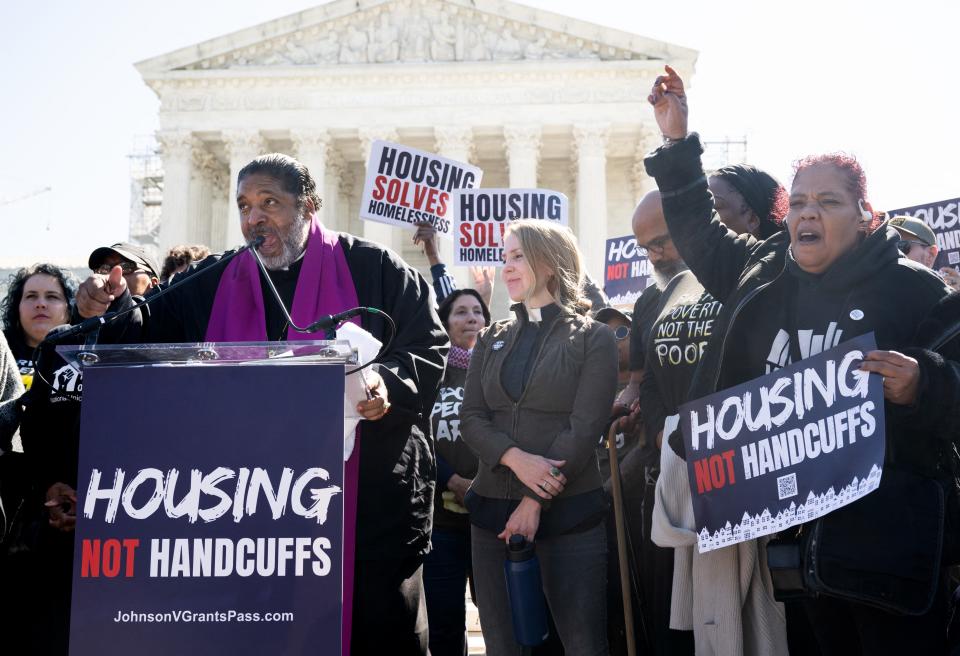Supreme Court should treat homeless people with dignity. Rule against Grants Pass.
Across the country, hundreds of thousands of our neighbors are being pushed out of homes and onto the street. This isn’t simply their choice; it’s the result of policy choices by elected leaders. Unaffordable housing prices and lack of safe shelter space are leaving cities and towns with a growing homelessness crisis.
This is the case in Grants Pass, a town of roughly 40,000 people in the southwestern corner of Oregon. While homelessness is not unique, the city’s aggressive response of $295 fines for people who have nowhere else to sleep is immoral.
Now, Grants Pass finds itself at the center of a lawsuit before the Supreme Court that will determine whether such punitive actions violate the Eighth Amendment, which prohibits excessive bail, fines, and cruel and unusual punishments. Justices heard oral arguments last month, and a ruling is expected in June.
Should America punish people for being homeless?

At the heart of this case is the question of whether we should punish people for being homeless. Many states and cities will look to the courts to resolve this issue, but we must also understand this as a moral issue.
Universally shared principles – from the Talmud to the Bible, from Jesus to the Prophet Muhammad, and from our founding forefathers and foremothers – today demonstrate universal agreement that society must not punish people for being poor. In fact, the Prophet Isaiah says the health of a nation depends on our willingness to welcome the homeless poor. “When you did it to the least of these,” Jesus says, “you did it unto me.”
In Grants Pass, there is no public shelter for unhoused populations, and even those who might otherwise afford housing under normal circumstances face a rental vacancy rate of just above zero. With no other options, many individuals turn to the streets.
Homelessness is a top concern: California knows the way to end homelessness. It's time to find the will.
The city’s strategy to remove this community was intended to make it "uncomfortable enough for (homeless people) so they will want to move on down the road."
But Grants Pass goes far beyond making it uncomfortable.
By prohibiting the act of sleeping with so much as a blanket in any public space, at any time of the day, any day of the year, Grants Pass effectively makes it illegal to be alive and homeless.
What is 'cruel and unusual' punishment?
By its very nature, determining what is “cruel and unusual” requires setting a moral threshold and then exercising a moral judgment. The Supreme Court has long established that the moral perspectives of faith-based communities are a relevant factor in determining what is “cruel and unusual,” including in cases concerning the death penalty, conditions of confinement and juvenile sentencing.
As a broad coalition of religious groups argue in an amicus brief in the Grants Pass case, sacred and religious texts have long directed society to protect poor and homeless people.
Homelessness is destroying my state: Supreme Court case has brought together bipartisan support for enforcing policies
In the constitution of my home state, North Carolina, “beneficent provision for the poor” is listed as among the duties of the state.
The teachings of our nation’s early leaders also affirm the dignity and protection of the poor and homeless. Since the time of America’s Founders – who enshrined the Eighth Amendment into the Bill of Rights – moral values have informed our understanding and interpretation of our rights.
Opinion alerts: Get columns from your favorite columnists + expert analysis on top issues, delivered straight to your device through the USA TODAY app. Don't have the app? Download it for free from your app store.
Thus, we can turn to both theology and our own constitutional documents for guidance as the issue of morality takes its rightful role front and center in this discussion.
The Supreme Court should affirm the dignity and protection of the homeless so that every human being is treated with inherent worth and dignity, including and especially the poor.
The Rev. William Barber is the president of Repairers of the Breach, co-chair of Unite the Poor, and founding director and professor at Yale's Center for Public Theology and Public Policy.
You can read diverse opinions from our Board of Contributors and other writers on the Opinion front page, on Twitter @usatodayopinion and in our daily Opinion newsletter.
This article originally appeared on USA TODAY: In Oregon homeless case, Supreme Court should rule against Grants Pass


